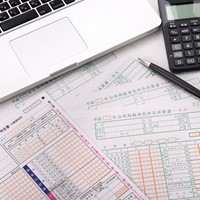Taxes in Japan: Filing Japanese Income Tax in Japan

For many foreign residents living in Japan it’s possible that the confusion and hours or research spent in filing Japanese taxes are negligible since their companies file on their behalf.
However, if 1) you’re self-employed, 2) your company happens to be based overseas, or 3) your company doesn’t provide tax filing services to employees, then there are a few steps you must take before Japan’s mid-March filing deadline. Let’s take a look.
> English-Speaking Accounting & Consulting Firms in Tokyo
Who needs to pay taxes in Japan?
If you’ve had some type of income in Japan, chances are you owe the Japanese government. Three categories exist for compulsory tax payers: Residents, Non-Residents, and Temporary Residents.
Residents
These are people who have a domicile in Japan through ownership or rental for one (1) year or more. Additionally, if your employment contract expresses a term of a year or more, you may be considered a resident with or without a listed domicile. Residents are also taxed on their income worldwide.
Non-Residents
These are people who are not domiciled in Japan. Even if you do not live in Japan, any income earned in the country is subject to taxation. However, if you are domiciled in Japan for five years or less and you are not a Japanese national, you are considered a non-resident. Please be aware of the above. If you have an employment contract that has a long term, you may be subject to taxation. And as below, money brought into Japan will be taxed.
Temporary Residents
These are people who come to Japan and work temporarily outside of Japan while being on a foreign payroll. Income from overseas that is not remitted to Japan is exempt from taxation. However, if income is transferred into Japan for any reason, such as to pay for a bill or goods, or even into a Japanese bank, then that remitted money is considered taxable income.

- Overview of Japan's Inheritance Tax for Foreigners
- An overview of the Japanese inheritance tax system, outlining the tax implications for heirs when a Japanese property owner passes away.
Which forms are needed to file your taxes?
In recent years, many people have completed their applications online. This is convenient if you have someone who understands Japanese or can assist you in Japanese.
Tax offices also offer advice on tax returns, although this service is only available in Japanese. Check here for the tax office with jurisdiction and make an appointment before going. Some municipal offices also offer consultation services however, as they may not be able to answer about certain types of taxes, it would be best to consult the tax office.
>> Find all the tax forms here
Abolishment of Tax Return Form A and B: Consolidation of Formats
The distinction between A and B upon submission has been eliminated, and the format now displays only as "Tax Return Form."
Withholdings Tax Slip
Around December (or sometimes August), your withholdings tax slip is provided to you by your employer or mailed to the address that you registered with the municipality you are domiciled. If you do not have this slip in your possession, you should make a trip to the city hall in the municipality of your registration.
Changes of the Tax Return Documents for 2024
The changes to the tax return documents for the year 2024 have been announced in the "Forms and Guidelines for Income Tax and Special Income Tax for Reconstruction for the Year 5 of Reiwa." While there are no major changes overall, some modifications apply to specific individuals.
The following is a translation based on the information found on this page.
Here are the key changes:
Family section in the Second Table of the Tax Return Form
If a spouse or relative falls under categories such as having a disability or residing abroad, mark the corresponding checkbox in the "Details about Spouse or Relatives" section on the right side.
Background of the change: The change in how to fill out the family section is influenced by the stricter requirements for dependents living abroad in the Japanese tax system since January 2023. Previously, dependents living abroad with an annual income of 480,000 yen or less and aged 16 or older were eligible for the dependency deduction.
After the legal amendment, additional criteria have been introduced for dependents aged 30 to under 70 who reside abroad. To qualify for the dependency deduction, these dependents must meet one of the following conditions:
1. They have ceased to have a residence or domicile in Japan due to studying abroad.
2. They are individuals with disabilities.
3. They receive living or educational expenses of 380,000 yen or more from the taxpayer claiming the dependency deduction in the respective year.
Removal of the "Non-Declaration System" Entry Section for Specific Stock Income
Previously, there was a section related to the "Non-Declaration System" for income from specific stocks in the Second Table of the tax return form. However, as depicted in the image above, due to the impact of the Reiwa 4 fiscal year tax system revision, this section has been removed starting from the income tax return for the fiscal year 2023.
Specifically, beginning with the income tax return for the fiscal year 2023 (including municipal and prefectural taxes [individual inhabitant tax] for the fiscal year 2024), the taxation method for dividend income, transfer income from listed stocks, and interest income from specific public bonds will be unified between income tax and individual inhabitant tax.
While it was previously possible to choose different taxation methods between income tax and individual inhabitant tax, this revision has been implemented based on the policy of designing financial income taxation as a cohesive system, considering fairness.
Overview:
1. If you choose non-declaration for income tax, the same applies to individual inhabitant tax.
2. If you file an income tax return under comprehensive taxation or separate taxation, the same taxation method applies to individual inhabitant tax.
3. It is no longer possible to choose different taxation methods between income tax and individual inhabitant tax.
Transition to Forms Compatible with the Invoice System
For the tax return documents to be submitted in 2024, the blue declaration settlement statement (for blue declaration) and the income-expenditure breakdown statement (for white declaration) have been changed to formats compatible with the Invoice System.
In the "Blue Settlement Statement" for blue declaration, until the Reiwa 4th fiscal year, there were no sections for "Details of Sales (Income) Amount" or "Details of Purchase Amount." However, starting from the Reiwa 5th fiscal year, these sections have been newly introduced, and similarly, an optional field for entering the registration number (corporate number) has been added.
In the "Income-Expenditure Breakdown Statement" for white declaration, details such as the name, address, and transaction amount of the trading partner were required in the "Details of Sales (Income) Amount" and "Details of Purchase Amount" sections. From the Reiwa 5th fiscal year, in addition to this information, new fields have been introduced for optionally entering the registration number or corporate number.
Change or Transfer of Tax Jurisdiction Generally Not Required
In the Reiwa 4th (2022) fiscal year tax system revision, procedures for taxpayers changing or transferring their tax jurisdiction were reviewed. As a result, starting from January 1, Reiwa 5 (2023), the submission of notification forms when moving or changing the tax jurisdiction for income tax and consumption tax became unnecessary. The National Tax Agency can now determine the tax jurisdiction based on submitted tax returns and other information.
For cases of moving or changing the tax jurisdiction after January 1, Reiwa 5 (2023), the following procedures are generally required:
Procedure Details:
- In the case of moving the tax jurisdiction: Specify the new tax jurisdiction in the income tax or consumption tax return.
- In the case of changing the tax jurisdiction: Specify the changed tax jurisdiction in the income tax or consumption tax return.
However, if there is a need to move or change the tax jurisdiction during the year, such as for updating contact information with the National Tax Agency, it is possible to submit a "Notification of Change in Income Tax and Consumption Tax Jurisdiction" form.
Support for Consumption Tax Returns by Invoice Issuing Businesses
For those who pay consumption tax, an update has been implemented to facilitate the creation of a declaration form for the so-called "20% Exception (*)", which reduces the consumption tax payment amount to 20% of the sales tax amount.
When generating simplified tax assessment forms or forms for the "20% Exception," the update enables automatic calculation of tax amounts based solely on input such as sales (income) amounts.
20% Exception: It is one of the "support measures" related to the Invoice System. Individuals who have become consumption tax-paying businesses themselves to comply with the Invoice System can choose the simple calculation method known as the "20% Exception" when filing their consumption tax returns.
When to Pay Taxes

If you are required to pay taxes beyond the amount withheld by your employer, Japan’s national income taxes are due in full by the March 15 deadline of the following year.
Prefectural and municipal income taxes may also be required if not withheld by your employer and are to be prepaid quarterly if filing Form B.
Paying Taxes in Your Home Country
While this guide has been created to provide a brief overview of Japan’s income tax process, it is important to remember that if you hold citizenship or permanent resident status in another country you may be responsible for filing there as well. Please consult with your respective country’s internal revenue office for more information.
We hope this article has been helpful in guiding you to some resource for preparing and filing your Japanese taxes. And since tax season isn’t the only time you’re required to pay up, we’ve compiled a list of payment methods for paying bills in Japan.
















